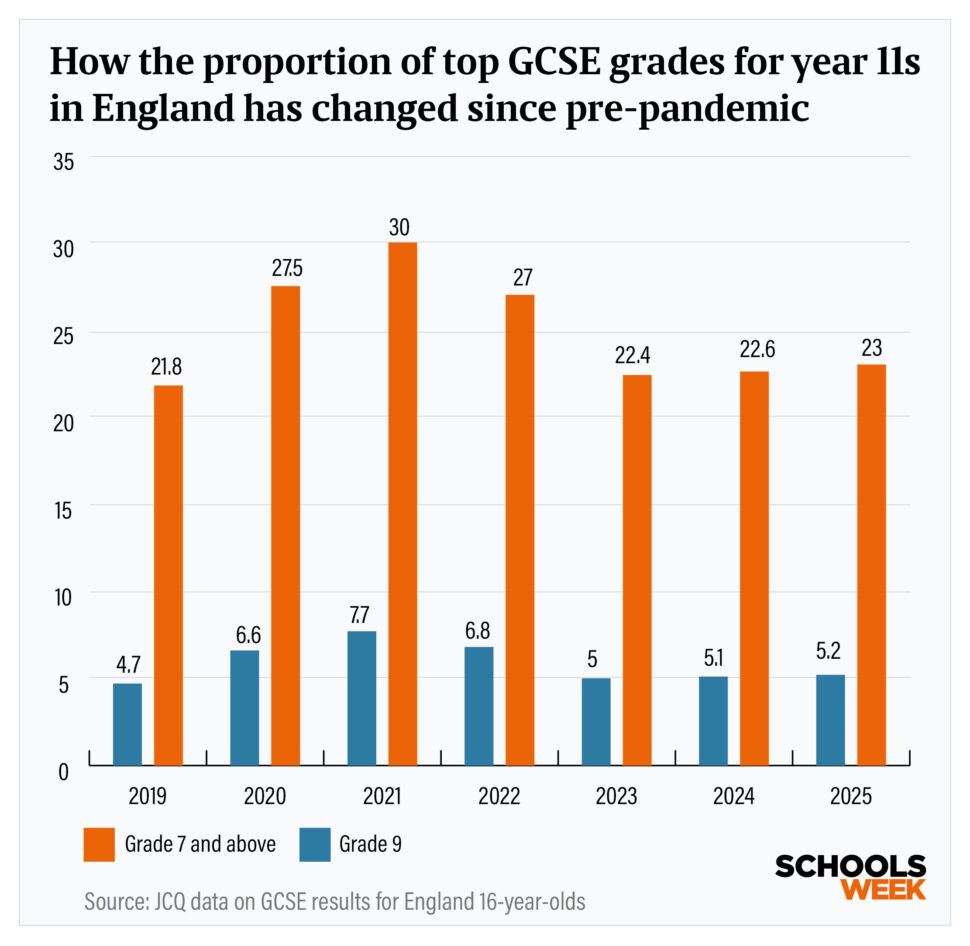The proportion of top grade GCSEs handed out to 16-year-olds in England has risen by almost 2 per cent, but regulator Ofqual has hailed “continued stability” in exam results.
This year, 23 per cent of grades were a grade 7 or above, up from 22.6 per cent last year, an increase of 1.8 per cent.
The proportion of grade 9s issued also rose slightly from 5.1 to 5.2 per cent, a rise of 2 per cent.

The results, like last week’s A-levels, also continue to show entrenched regional disparities. According to Ofqual data, the proportion of GCSEs at grade 4 and above issued this year ranged from 62.9 per cent in the West Midlands to 71.6 per cent in London.
However, Ofqual said it was “worth noting that the gap between London and the rest of the country has narrowed slightly at GCSE grade 4”.
Ofqual chief hails ‘stable’ results
This year’s increase in the proportion of top grades is the second successive rise since 2023, when Ofqual asked exam boards to return to pre-pandemic grading standards.
The proportion of grades 7 and above is now 5.5 per cent above pre-pandemic 2019, and the proportion of grade 9s is now 10.6 per cent higher.
But the exams regulator Ofqual said the results “demonstrate continued stability, with overall outcomes showing only minimal variation from previous years that fall within the boundaries of natural year-on-year fluctuations”.

Chief regulator Sir Ian Bauckham said: “Today’s GCSE and vocational qualification results represent each student’s passport to opportunity.
“By ensuring that rigorous standards have been maintained year on year, these qualifications retain their value and meaning.
“Schools, colleges and employers can trust these results when making decisions that will shape these young people’s futures, while students can be confident that their achievements will open doors to educational and career opportunities.”
Overall pass rates up, but down in English and maths
The grade 5 pass rate – considered a “strong pass” – increased by 0.7 per cent from 54.6 per cent last year to 55 per cent. This is also higher than in 2019 (53.5 per cent).
The grade 4 pass rate – considered a “standard pass” – increased by 0.1 per cent from 70.4 per cent last year to 70.5 per cent this year. Again, this is higher than in 2019 (69.9 per cent).
However, as was seen last year, the proportion of pupils achieving a grade 4 or above in English and maths fell slightly, meaning more face re-taking the qualifications during their post-16 education.
This year, 70.6 per cent of grades in GCSE English were at grade 4 and above, down 0.8 per cent on the 71.2 per cent seen last year. In maths, 71.9 per cent of GCSEs were a grade 4 or above, down 0.1 per cent from 72 per cent last year.
Entries fall
Entries to GCSEs in England among 16-year-olds fell from 5,214,826 in 2024 to 5,146,724 this year, a decrease of 1.3 per cent.
This was predicted in provisional entries data published by Ofqual earlier this year.
During a briefing this morning, Myles McGinley, from exam board OCR, said the reduction was “partly driven” by pupils switching from taking separate sciences to the double award.
He also pointed out there had been “a very slight reduction” in the average number of GCSEs taken by pupils. This has gone from 7.81 last to 7.8 this year.
‘Investment needed’ to tackle disparities
Pupils who sat their GCSEs this year were in year 6 when the first lockdown began and started secondary school shortly before schools closed to most pupils again in early 2021.
They did not take SATs at the end of primary school, meaning progress 8 scores will not be published later this year as they would normally.
Pepe Di’Iasio, general secretary of the Association of School and College Leaders, said the cohort had “experienced a great deal of disruption earlier in their time at school as a result of the Covid-19 pandemic.
“Disadvantaged students were often those most severely affected by the disruption of Covid and that has made it even more difficult to close gaps in educational attainment caused by socioeconomic factors.
“Those gaps are reflected in regional disparities evident once again in this year’s results. We simply must do more to invest – educationally, economically, and socially – in communities suffering from generational disadvantage.”
Grading wasn’t adjusted despite NRT results
Ofqual has also published a digest of this year’s national reference test results. The NRT is taken by a sample of students each year to monitor pupil performance over time and inform GCSE grading.
This year, the NRT found that in English, performance was “statistically significantly lower at grade 4” when compared to 2017. It also found that in maths, there was a “statistically significant upward difference at grade 7 compared with 2017”.
However, English grading was not adjusted as there was “not sufficient evidence of a genuine decline in performance, relative to 2017”.
In maths, Ofqual considered that the outcomes were similar to those seen in 2024 and 2019, and grading was not adjusted in those years.
“Taking into account our principles of consistency (that our decisions should be consistent between years) and acting judiciously (that we will be cautious in applying any adjustment), we therefore decided not to make an adjustment in maths at grade 7 this summer.”
As pointed out by FFT Education Datalab, the NRT estimated improved attainment at grade 5 and above in England for this cohort. But the proportion of those grades actually fell.
“Ofqual did not require the awarding bodies to increase grades this year despite the NRT results. This does raise the question of what level of change would be required for them to do so,” the organisation said in its blog post.
Bauckham defends NRT decision
But in an interview with Schools Week, Bauckham defended the NRT, which he said was the “most sensitive and sophisticated instrument we have for tracking underlying performance standards in English and maths for 15-16 year olds approaching their GCSE.
“We have always been clear that we would only use data or evidence from the national reference test to make an adjustment to standards if we see a clear, strong and sustained trend upwards or downwards in any of the measured grades in either of the subjects.
“What we’re not seeing today is precisely that. We’re not seeing a sustained, clear, strong trend in performance change in either subject.”
In response to last year’s NRT, which showed a small drop in English performance at grades 4 and 5, Bauckham said at the time that “we don’t know yet whether that is going to turn into a trend”.
Speaking today, he said that “in fact, this year’s results have told us that that trend doesn’t appear to be strengthening or even continuing. This year’s results show a flattening.
“We’ve always been clear that we won’t use the national reference test to tinker with well-established standards for grading.
“But I think the national reference test remains an extremely important part of the architecture of the system. It is the only metric we have that measures the underlying performance standard, and, incidentally, did so continuously all the way through the pandemic, which is, I think, is of exceptional usefulness.”








Your thoughts